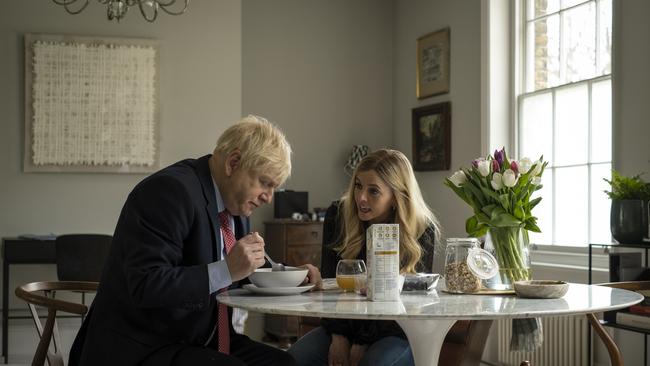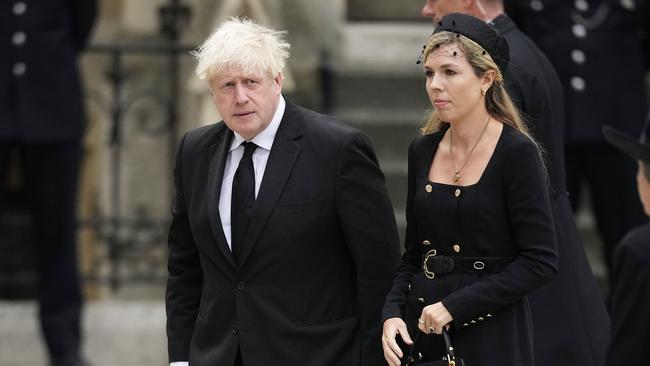This England review: Much ado about Boris
Shakespearean in his incompetence, the former British PM’s appalling handling of the Covid crisis is laid bare in a new satirical drama series.

I’ve just been catching up with This England, and what an entertaining, kaleidoscopic series it is too, if at times grimly moving and emotional. It’s from that somewhat idiosyncratic, provocative and prolific director Michael Winterbottom, who has been an arthouse and festival favourite for decades, despite only two of his movies, Jude and 24 Hour Party People, having been commercially successful. But what an eventful career this mercurial director has had, even if he’s often affectionately accused of “jumping between genres like a frog on a bouncy castle”.
He’s fond of shooting fast in actual locations around the world with minimum hassle, often working in an inconspicuous, semi-improvised documentary style. This England looks at the first pandemic lockdown in the spring of 2022 in Britain, and it’s a frantic, fly-on-the-wall immersive account of the way the British authorities initially responded to Covid (or didn’t respond, as it turned out).
The hapless Boris Johnson, then newly ensconced as prime minister, is at the centre, comically swaggering, coping rather poorly with his domestic life and constantly reciting Shakespeare. (Though early on in the story, with the country divided on the issue, he’s seldom seen not shouting “Let’s Get Brexit Done”.)
The series follows the early days of Covid, including Johnson’s hospital admission after catching the virus following his seven-day period of isolation in Downing Street and his son’s birth, but stays clear of the so-called Partygate shenanigans that finally brought him undone.
Played by Kenneth Branagh with some brilliance, wonderful prosthetics and an obvious love of pantomime, Johnson is a major strand in some stylish storytelling, if rather agitated at times, but the series, as Winterbottom says, is really a mosaic of many different stories. (A card at the beginning warns us this is “a fiction based on real events”.)
And it’s a breathtaking production. Director of photography James Clarke lights and choreographs with his cameras dozens if not hundreds of scenes, with casts crammed into hospital wards, the suffocating confines of Downing Street or the meetings of scientific panels. Winterbottom calls the tightly evolved series a kind of collage of all their stories interwoven into “a diary, or chronicle, or calendar of the first wave” at the end of May 2020.
It’s not a character study in itself, though Branagh is a hard actor to keep down when flying with someone as fascinating and flawed as Johnson.
Apart from Branagh, it’s largely an ensemble cast. You might, however, recognise Andrew Buchan from Broadchurch as Boris’s former secretary of state for health and social care Matt Hancock, and Simon Paisley from Brexit: The Uncivil War as the PM’s senior adviser Dominic Cummings. Paisley is good as the demonic Cummings who simply believes the political system doesn’t work, and wants to recreate it to his own vision.
And the less well-known Ophelia Lovibond is Johnson’s then fiancee (now wife) Carrie Symonds, who often steals the show from Branagh. It’s a lovely performance. At times she’s charming, at others tenacious and ambitious, though she steers well clear of the Lady Macbeth moniker with which Symonds was saddled. It can’t have been easy. “I would be seeing her face in my newsfeed and I’d be sitting there in my wig and the baby bump practising my lines, so that was quite strange and I didn’t get used to that,” she told Esquire.
Winterbottom in fact instructed her to be “as naturalistic as possible, to not play to any bias”. One scene though raised comment where Carrie holds a lavish baby shower in Chequers while the virus takes hold. It is a scene some saw as having a touch of Marie Antoinette about it.
There are no backstories to the many other characters – just a huge number of graphics telling us who they are and what department they work for, all only viewed in relation to their work and in their attempts to cope with the pandemic. It was a response, as Winterbottom demonstrates, that was so poorly communicated and eventually co-ordinated.
The focus is on a broader picture. Winterbottom, who co-wrote the series and directed with Julian Jarrold, spoke to numerous scientists, doctors, nurses, care-home workers and people with Covid, apart from many of the politicians and government officials involved with its attempted control.

Winterbottom cleverly and propulsively interweaves the parallel stories of the approaching pandemic and the confusion surrounding it and an unfocused, side-tracked prime minister, and does it at breakneck speed.
For Winterbottom, the idea of his treatment was to replicate the pace at which events occurred. “One moment it seemed to be just something that was happening in China, the next moment it was happening in Italy, then it was with us in the UK, but not too bad, and then suddenly it was everywhere,” he has said.
“And that sense of trying to catch up is what we’re hoping to capture in the series.”
This England was chosen as a new title by producing network Sky Atlantic “in their wisdom”, according to Winterbottom, in place of original This Sceptred Isle. Both phrases emanate from the same passage in Shakespeare’s play Richard II. (The quotation comes from John of Gaunt, part of his dying monologue, using his last words to mourn his country’s fate in the hands of Richard II.)
And Branagh takes some delight in Johnson’s constant quoting of the Bard, with the prime minister working during this period on a much delayed book on Shakespeare.
It begins in the middle of 2019 with Johnson hastily leaving a London flat, dodging reporters as he goes, after neighbours complain to police of a domestic row between the Tory leadership front runner, following the resignation of Theresa May, and his latest girlfriend Carrie Symonds. A quick cut introduces the mellifluous Charles Dance as Max Hastings, Johnson’s former editor at The Daily Telegraph. “For many of us his election will signal Britain’s abandonment of any claims to be a serious country,” he says.
Quickly though we’re celebrating Johnson’s landslide victory later at the end of 2019, as Brexit looms large in the minds of voters, swinging traditional Labour constituencies to the Conservatives. Johnson is in full flight at the party celebrations. “We can look forward to the broad, uplit sunlands, a new dawn is breaking, 2020 will be a year of prosperity, growth and hope,” he tells his cronies and acolytes.
But then we’re taken to China where a new disease caused by a novel coronavirus is spreading; a strange series of cases presenting in December in Wuhan, a city of 11 million people, 800 cases of the new disease confirmed.
Speedily we’re thrust inside the maze of rooms behind the black door of 10 Downing Street. The government, erratically led by Johnson, who seems far more interested in working on his book or trying to make phone contact with his various children who want nothing to do with him, attempts to comprehend the problem as the virus spreads.
He blunders around looking for underlings to take his dog for walks as the situation changes at a pace almost impossible to comprehend. The lockdown is continuously delayed and the death toll ratchets up.
Johnson, now coping also with the pressures of divorce, becomes increasingly depressive.
At one point, indolently painting canvases with Carrie, he wanders to a window and quotes Hamlet as he looks out: “I have of late – but / wherefore I know not – lost all my mirth.” As it was for Hamlet, the world for Boris has become a sterile, empty place, even as the virus is now spreading rapidly.
There is something innately comic in Johnson, and Branagh milks it mercilessly, either – deliberately or somewhat inadvertently referencing some of the great British jesters. There are touches of Frankie Howerd in the floundering and fussiness and the lugubriousness of Tony Hancock.
Some might recall Max Wall and the way he made such comic currency out of the sheer desperation that so accompanied his profession. As the writer John Fisher says, no comic ever thought aloud so candidly, a trait Johnson shares in Branagh’s clever performance.
He has too the same loose-limbed acrobatics and silly walks ensuring all eyes are turned. Fisher gives a lovely example. “Ladies and gentlemen, I shall be walking up and down for you, giving you the benefit of my smile. Sticking out my bottom for you, and you will find it very attractive. Then there’s a drum roll and off we go. Up and down, backwards and forwards, on and on. Sometimes I think it could go on forever.”
This England is streaming on Foxtel.




To join the conversation, please log in. Don't have an account? Register
Join the conversation, you are commenting as Logout